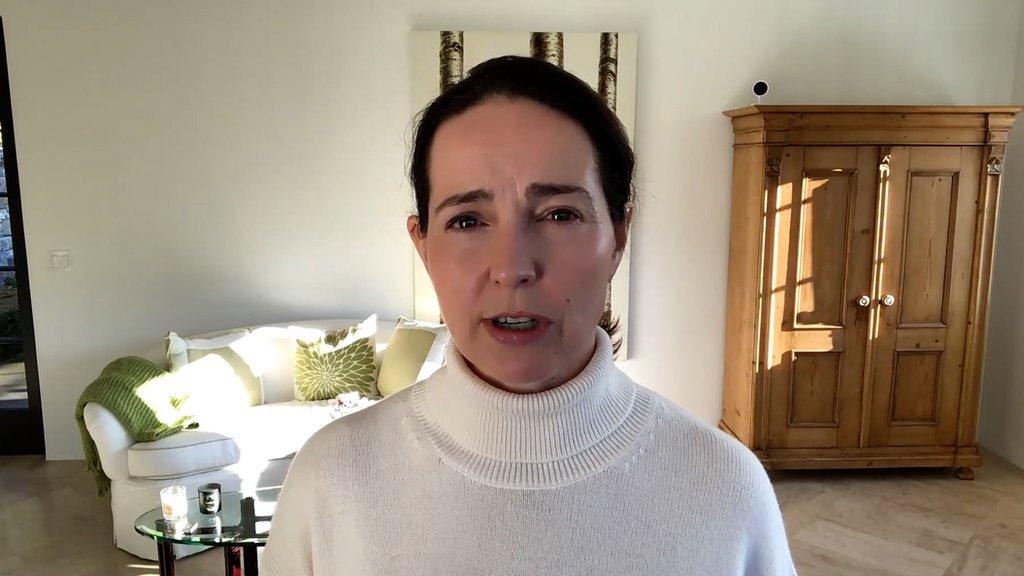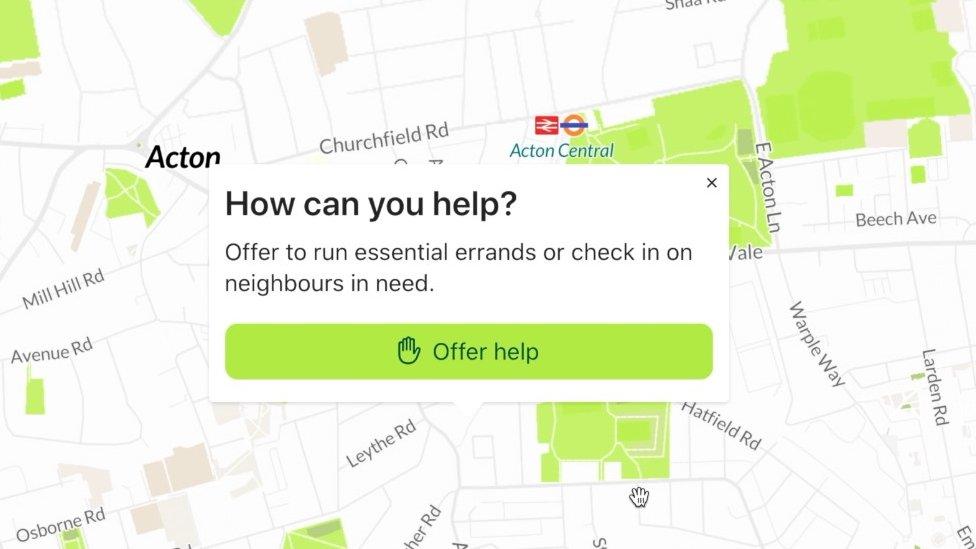From bike lanes to lost pets - how the Nextdoor network works
- Published

The community-focused Nextdoor social network has grown substantially during the pandemic, but has had to make changes, says chief executive Sarah Friar, in an exclusive interview with the BBC.
Nextdoor, unlike the bigger social networks, is designed to offer a hyper-local experience, creating social newsfeeds about your neighbourhood, with posts by verified people who live near you.
The California-based company has now more than 66 million users, the majority of them in the United States.
Users of the platform find things like lengthy debates about new bike lanes, photo montages of mysterious strangers loitering outside houses, and heartfelt pleas for lost pets in their feeds.
But there are also sometimes heartwarming acts of kindness, when the community rallies round to help those in need.
Nextdoor says the app is used by one in five households in the UK, where it launched in 2016. You must provide extra proof of your identity like a billing address to sign up.
Its daily active usage was doubling on a weekly basis as the pandemic took hold in early 2020, according to Ms Friar. Her team could see engagement levels spike in Italy, then across Europe, to the UK and Australia, as Covid-19 swept the world.
"It has the awesome outcome that you feel you are there for your customers, but we also had to make sure the back-end technology was really going to scale," she says.
After worries about the technology being up to the task were addressed, it was user experience that became the priority.
During the pandemic, many people have used it to share information about things like vaccine centres and walking groups for the lonely, or to issue pleas for food packages to be delivered to loved ones.
The platform made several changes in light of the pandemic, explains Ms Friar.
It created "help maps" to allow volunteers to identify themselves, ready to offer their services to those who needed them, for things like food deliveries to people who are isolating.

It also allowed businesses to post directly into people's newsfeeds.
This represented a significant change for Nextdoor, because in its early years all commerce was banned on the platform. Many at the company saw commercial activity as "inauthentic", "antithetical to a kinder world" and running contrary to the company's original community-building goals, says Ms Friar.
"[But] Very quickly we saw local businesses starting to flounder [in lockdown] and we wanted to help them."
The other big issue across all social networks is, of course, disinformation around Covid-19.
"A lot of people were accidentally spreading misinformation," says Ms Friar. "They hear something from a neighbour, they put it on the platform, suddenly it gets this viral effect."
In response the company introduced a "Covid misinformation reminder", a pop-up box triggered when users are set to post keywords, like "vaccine".
This prompts people to source information they are posting, with links to trusted resources like the NHS or government portals. It only pops up on the first occasion a user prepares to post using this language.


This was an adaptation of the company's kindness reminders, which have appeared since 2019, when someone starts to compose a post using inflammatory words.
Last year the platform added a similar function triggered by any racist language, in the wake of the Black Lives Matter protests. Racism and racial profiling has been a big issue for Nextdoor, especially in the United States.
It uses community volunteers to help with moderation, keeping users within the guidelines - they have the power to vote content off the platform.
However, Nextdoor experienced problems in 2020 when moderators deleted content associated with the Black Lives Matter movement, for being part of national rather than local conversations - Ms Friar had to step in to make clear such conversations were indeed allowed within the guidelines.
Nextdoor was founded in 2010 by a group of friends, many of whom had originally worked at Shopping.com. The initial prototype of the network was set up to serve a small community in Menlo Park in Silicon Valley, California, but the successful model quickly spread around the States.
The company, which still makes a loss, floated on the US stock market last year and was valued at $4.3bn (£3.1bn).
Sarah Friar interviewed in 2019 shortly after becoming CEO
Ms Friar joined Nextdoor as chief executive in 2018 after working at Salesforce and Square. She is still something of a rarity as a female tech chief executive in Silicon Valley.
That's one reason she founded another enterprise, Ladies Who Launch. Its purpose is to help female entrepreneurs network and access business education resources.
The idea for this came from a "lightbulb moment", she says.
"Women and minorities find it really hard to find their tribes. White men don't have the same experience, because you walk into a business meeting and largely everyone looks like you.
"You're kind of getting peer-mentored all the time and you don't even think of it, it's just your life.
"But when women walk into a room there can be no-one who looks like them - or people of colour - so [when] bringing together women, we realised that there is huge power in peer mentorship."